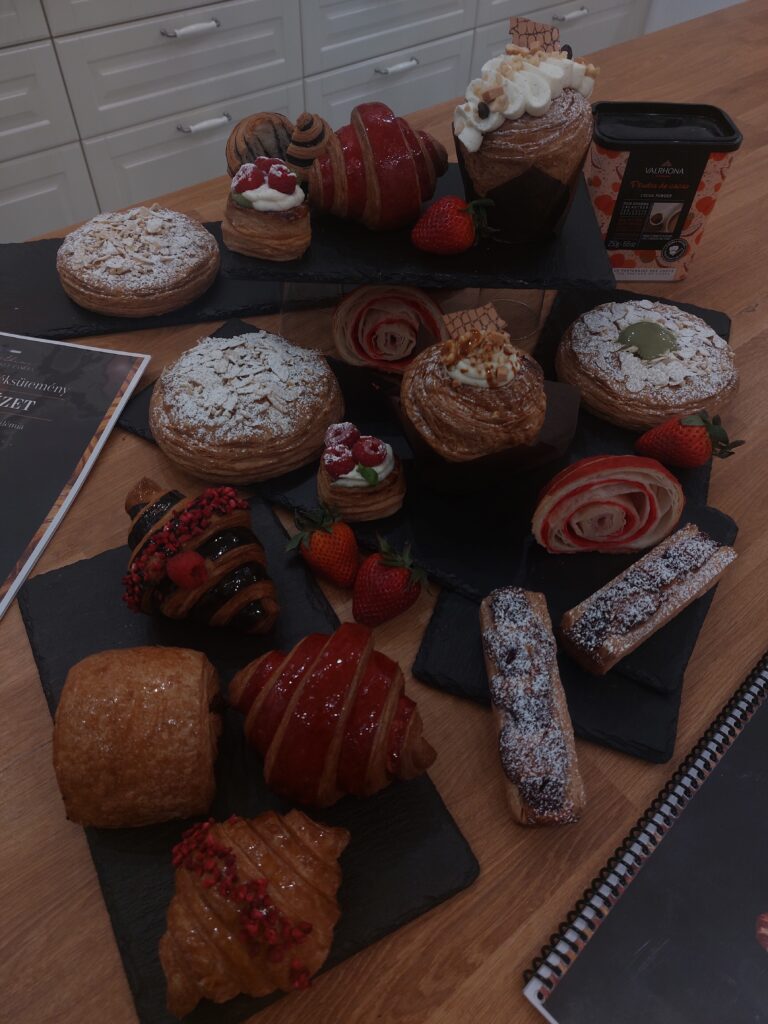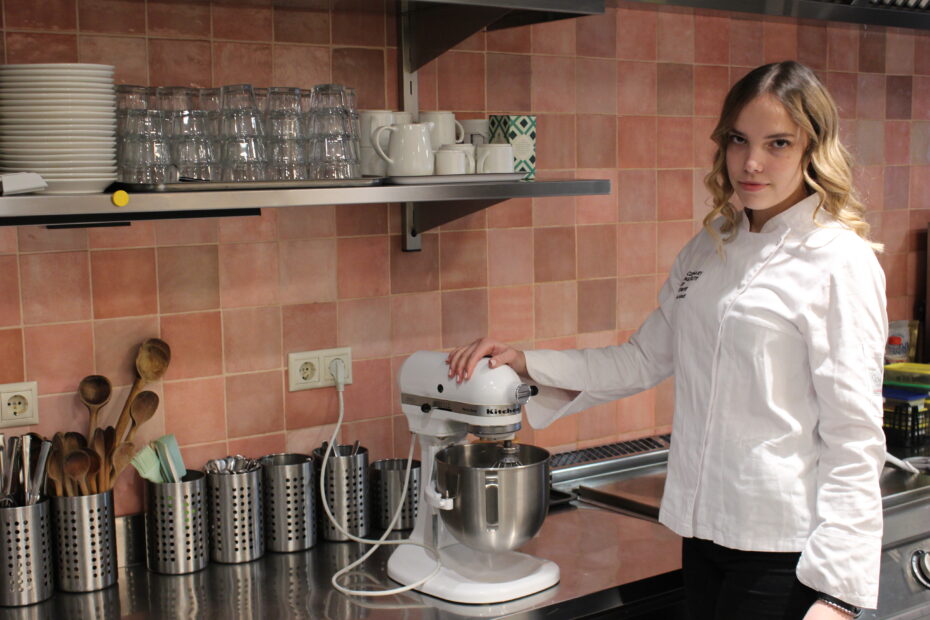Anett Hartmann graduated from CIE’s one-year Confectionery Arts programme last year, which not only gave her a qualification, but also helped her find a job through the apprenticeship programme. In order to receive a certificate of completion (which can then be used to apply for the state exam to become a pastry assistant), a student must complete an internship with one of our professional partners, in addition to classroom hours. These include Michelin-starred and Michelin-recommended restaurants in Budapest, but students can also spend their placements in hotels. Since last summer, our partners have included the country’s most prestigious hotel, the five-star Four Season, where Anett spent her internship, which went so well that she was offered a job as a pastry chef in the hotel’s kitchen after it was over. We asked Anette about her motivation, her time at CIE and her current job.
Where did your interest in pastry come from? What motivated you to apply for professional pastry training?
My first job was at the Augoust confectionery, working as a waitress. I have always enjoyed watching the pastry chefs in the workshop and have had the opportunity to help them on several occasions. That’s where my interest in sweets came from, so I decided then and there that I wanted to do it later. I’m currently studying dietetics at Semmelweis University, and that’s why I wanted to complement it with pastry, especially as there are so many dieticians and the market is saturated, so I wanted to expand my knowledge in another directions as well.
Dietetics and pastry seem to be two completely opposite professions. How do you reconcile them?
There are more and more sugar-free products, more and more people are aiming to consumer sweets with reduced calories, so it’s a growing area within confectionery. As a dietician, I would also like to specialise in diabetics. But there is also a growing range of different free-from products, whether gluten-free or vegan. There are a lot of foods and ingredients nowadays that we don’t even hear about at university, but at the pastry school and at the hotel I was able to learn about them and use them. I now know how to work with them, which has broadened my horizons. Combining alternative ingredients with dietetics is very exciting for me.
What did you like the most about the Culinary Institute of Europe’s pastry training?
What I liked most was that I started studying pastry at the same time as several of my class mates, but at the Culinary Institute of Europe we didn’t learn to make Dobos cakes or Eszterházy like at other places, but fine dining desserts. It was also great that there weren’t twenty or thirty of us in the group, so everyone got attention. I would especially like to point out that chocolate tempering was not something I had heard of being part of the curriculum elsewhere, and here there was a separate class about the topic. I really liked the modern approach.
Were there any lessons that you particularly enjoyed at the school?
One of my favourite class was chocolate, we made really good bonbons, but the cake class was also exciting. We got to work with special tools and ingredients and I got to see desserts that I wouldn’t have had the opportunity to make otherwise.
The Four Seasons is one of, if not the, most prestigious hotels in the country. How did you manage to secure an internship at such a prestigious place?
At first I wanted to do a traineeship in a restaurant, but I realised that I would be making four or five desserts there, and my goal was to work on as many different types of cakes as possible and to get a broader insight into the profession. That’s when I started to get interested in hotels. My first choice was the Four Seasons, and to my great delight after the interview they decided they wanted to work with me. We were the first CIE students to go there, and I worked there all summer, so I could graduate in fall. And after the internship was over, they decided that they wanted me to continue to be part of the team, so now I work there 3-4 days a week while I’m at also at the university.
What is it like to work at such a prestigious institution?
The quality of the materials is extremely high, the order, cleanliness and discipline are outstanding. I am a perfectionist myself and I really like the way they work there. Árpád Szűcs is the boss, and if there is something I don’t understand or haven’t learned about, he helps me and explains it. I can always ask questions to the staff and thus improve, which is very motivating.
In the pastry profession it is important to keep training. At the beginning of your career, what sources did you learn most from, did you complete your pastry training?
I had a huge chocolate book at home and I learned a lot from that. My colleagues also have a lot of books, they often lend them out, and when they go to training courses they always report back afterwards. I also try to go to events where I can hear new things, for example I recently attended a course where all the cakes were gluten-free and 90% vegan.

What are your responsibilities at the Four Seasons?
It’s always different. From the beginning, for example, I’m in charge of the room set-ups, because they have to be put together according to a template, so it’s a task that you can’t really go wrong with. I’ve also done the cream and mousse baths from the beginning. During my traineeship and then in my first months I mainly did partial tasks, certain steps, but gradually I got more and more involved in the more difficult tasks. Now I’m being asked to do all types of tasks, even those with more responsibility, such as making cakes. It feels really good to be trusted.
What’s your favourite area of pastry now?
At Christmas I really like decorating gingerbread, I adore the meticulous work with the icing. Macarons are one of my favourites, I love them, I often experiment with using erythritol instead of sugar for example and see how it behaves. It’s another way I try to expand my knowledge.
What are your goals for the near future?
I don’t feel that my knowledge is stable yet, I need to ask more questions about things, so my main goal now is to gain as much experience as possible. For example, if something goes in a little bit too much compared to the recipe, I don’t know how to fix it myself yet. As a result, I can’t yet develop recipes on my own, so I want to learn. I’m in my second year at university, I’ve got two years left, I’d like to stay in the hotel until then and see how it goes.

